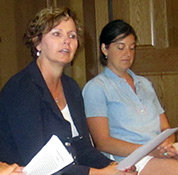- Campuses :
- Twin Cities
- Crookston
- Duluth
- Morris
- Rochester
- Other Locations

center for writing
mwp.umn.edu
Kay Rosheim
©2015
 The Gift of Life
The Gift of Life
In memory of my sister-in-law Nancy, who savored each day
Cancer is a horrific disease.
With no family history, Nancy had been diagnosed with breast cancer 12 years prior. She thought it had been caught early. After completing a regimen of chemotherapy and radiation and the physical and mental challenges that accompany it, she received a “clean bill of health” from her doctors.
She was grateful for another chance at life and for several years received good news at each annual visit to her oncologist. The statistics grew in her favor, diminishing the thought of her hovering mortality. Life eventually returned to a more normal state. Her identity shifted from Nancy as a sick person to Nancy as a golfer, a gardener, and an artist.
She took on a new role, that of being a grandmother.
Earning the title of Nana was an honor she embraced with all her heart. It was better than parenting—different, for she too was different. There were fewer constraints on her time and money so she was calmer, more relaxed. She had learned how temporary life is and how quickly things can change. She appreciated even the most routine and simple things, especially time with her grandchildren.
With the birth of each new grandchild, she rushed to her own child’s side to lovingly welcome the newborn in her arms, each time within hours of the baby’s first cry. From Hunter, the oldest, to Clementine, the youngest, and Alex, Jake, Penelope, and Margot in between, Nancy was there for them all, even traveling to Japan to hold her grandson Jake as he took his first sweet breaths.
Back home in Chicago after celebrating Thanksgiving, headaches leading to seizures alerted her that something was not quite right. Days of tests and overnights at the hospital uncovered the truth that had not been a part of the family holiday picture.
“I’m sorry”, the doctors told her.
“The breast cancer has metastasized to your brain, lungs and liver.”
This was not her plan. Though discouraged, she didn’t give up. Life was too precious. She bravely heeded the advice of the oncologists and nurses who grew to be her lifeline. She, with her husband at her side, planned their days around appointments with doctors and her treatments. Needles and nausea were her new normal.
She knew the prognosis. Her cancer, while not curable, could be managed, which might mean more days with her family, so for almost three years she graciously endured this painful regimen in an effort to prolong her life. She used this time to bake cookies with her grandchildren, looking the other way when they wanted to eat the cookie dough (something that she wouldn’t have done with her own children). She read books to them, gave them art classes, planned special days together. During these times she savored the gift of more days, turning moments into memories for her grandchildren and the whole family.
Yet, despite the gallant effort to gain more precious time, the weight fell off her small frame and the wigs chosen with care and fit to precision at the start became too big and obvious. She grew tired and so very weak. The end of this phase was drawing near. It was time to say goodbye. The doctors confirmed what she already knew, that there was nothing more to do, the cancer was now in her bones.
There was an urgency to say her goodbyes. The family gathered at her bedside, flying in from all over the United States. She told them she knew it was the end and assured them it would be all right. She asked for hugs and told each of them that she loved them.
She loves them. But for now, it is time to say goodbye.



